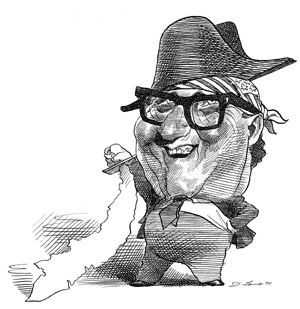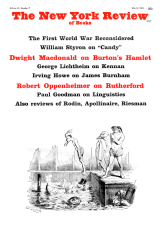Ambitious in scope, this book seems to promise a major effort; rigid in preconception, it turns out to be as puerile as a Birchite pamphlet. And the wonder of it is that the author is not a backwoods Claghorn, a fundamentalist screamer, a demented candy manufacturer. He is an intellectual. He can quote St. Thomas, he knows what Pareto meant by a “derivation,” and he has written ably on Kafka.
In America we have become accustomed to thinking of the reactionary as a small-town primitive marked by the pathos of cultural obsolescence and moral fright. Historically, there is much to be said for this image. But in Professor Burnham we have something rather new, an American reactionary on the French style: the “aristocratic” intellectual who makes no pretense to humaneness; gladly proclaims his chauvinism, breathes a frigid contempt for the plebes, and indulges in public fantasies of imperial grandeur. It should be said in his behalf that Burnham’s public career has been temperamentally consistent, even if ideologically distraught: he has always been a cold-blooded snob, first as a Trotskyist, then as herald of the “managerial revolution,’ and lately as geo-political strategist in charge of World War III for the National Review. Though sophisticated enough to go through the motions of intellectual complexity, he is driven by an urge toward apocalyptic crudeness; and all those who will not plunge with him into preparations for atomic fin du mondisme he regards as “confused” or “muddled” or “weak” liberals, mere patsies for the oncoming Communist hordes, and more to be despised than pitied. Whatever his ultimatistic obsession of the moment (and there have been quite a few), he finds it hard to repress a well-bred snarl for those men of humane doubts who refuse to go along with him each time he discovers a new mission.
To whom, one wonders, is this strange book addressed?—this rodomontade blending academic hauteur with fanatic shrillness, which announces, as if it were a fact beyond dispute, that the West has been seized by a lemming-like impulse toward collective suicide, for which liberalism provides the ideological rationale; that American foreign policy (perhaps because deprived of its bodily essences?) is suspiciously soft on Communism; that the boundaries of “civilization” are being steadily contracted under assault from barbarians; that the Welfare State corrodes American freedom and character; and that the streets of our cities are menaced by dark-skinned hoodlums.
The conservative faithful have heard it all before, though hardly from so cultivated a source; and surely the literate public is not likely to respond to this odd yoking of Ortega y Gassett and General Jack D. Ripper. But after a time I found an answer to my question: the book will serve admirably as a tip-sheet, a Barnes & Noble handbook, for campus conservatives, those little-league Goldwaters looking for debater’s points with which to stun liberal professors. Here they can learn that some liberals (those who do not wish to invade Cuba) shamefully prefer Peace to Freedom, and that liberal theory is beset by an inherent conflict between its devotion to popular sovreignity, which can sometimes lead to popular tyranny, and its devotion to minority rights, which can sometimes lead to social immobility. (Hardly a problem for Burnham, however, who is not very infatuated with either term of this dilemma.)
Most of the book is devoted to an agonizingly slow description of liberalism, as if Burnham had been traumatized by too much exposure to dimwitted students.
You can learn here that the ADA is a liberal bulwark, that Arthur Schlesinger, Jr. and Eleanor Roosevelt are representative liberals, that most liberals are internationalist in outlook—red-hot news that will just shake up everyone at Bob Jones University. A curious result of this baby-talk analysis, however, is that the American liberal emerging from Burnham’s pages seems far more principled, tough-spirited, and intellectually coherent than he is likely in fact to have been these past few decades; for Burnham will have nothing to do with the qualifications and modulations of political reality, and as a result the fact that the distance between most American liberals and most American conservatives has recently been lessening, never appears in his pages. He’s a black-and-white man; and he stands for white.
The true qualities of his book come out in a sentence here, a passage there. In a section worthy of Josiah Bounderby, he mocks those liberals who wish to erase such symptoms of social pathology as Skid Row, for “Skid Row is the end of the line; and there must be an end of the line somewhere.” He deplores the “deterrence” strategy held by official U.S. opinion as “a gigantic bluff,” for—believe me. I’m quoting accurately—“the purpose of the entire strategic nuclear force is not at all to be used.” (I don’t say we wouldn’t get our hair mussed up…) He is troubled by the double-standard of liberalism, its tendency to excuse methods employed by underdogs which it would condemn if used by oppressors. Writing about the treatment of Negroes by Southern cops, he remarks: “The truncheons of hard-pressed police struggling to preserve the minimum elements of public order against unloosed chaos become [for liberals] Satanic pitchforks…” This concern for impartiality leads Burnham to notice that “There has never been a liberal protest against the outrages committed by the South African Negroes.”
Advertisement
The author of Suicide of the West is a versatile, many-sided figure. Professor James Burnham, mellow sage of conservatism, notes that not all human troubles can be eradicated and that, sad as it may be, we had better reconcile ourselves to the likelihood that other peoples will continue to suffer hunger. Fighting Jim Burnham, last of the individualists, remarks that he has no objection to social security, but resents the Welfare State’s imposition of automatic social security and wishes it would allow citizens a choice of voluntary systems. (Whether he favors a similar voluntary arrangement in regard to the draft, he does not say.) Sir James, Leftenant General in His Majesty’s forces, bemoans the loss of those “splendid fighting men…the Gurkhas, Sikhs, Senegalese and Berbers…not the least of the grievous losses that the West has suffered from the triumph of decolonialization.” Old African Pioneer Burnham, looking Voerward, decries independence in East Africa as “the occasion when native black men, who have neither spun nor reaped, can take for nothing or next to nothing many of those splendid farms and ranches that the knowledge, effort, foresight, administrative ability, and capital of Europe-sprung white men have slowly brought into being…” And most spectacularly, behind a mountain of maps, Chief of Staff Burnham, fighting grimly to stiffen the jellied spine of the West, counts off the loss of our forts and our ports:
The great harbor of Trincomalee, commanding the western flank of the Bay of Bengal, southeast Asia and the Strait of Malacca, ceases to be a Western strategic base. Gone too are the mighty ports of Dakar and Casablanca, looming over the Atlantic passage. Of the guardian bases of the north African littoral, southern flank of Europe, only Mersel-Kebir remains…
And yet, and yet, am I perhaps unjust? Is there not still another James Burnham, a good man with a kindly wink, a cheerful nod, for the lowest orders? Movingly he tells us about two Negroes—“cheerful, pleasant fellows” of course—whom he sees regularly in New York and who work at collecting piles of old paper-board boxes. Their IQs “were almost out of sight” (would a mere liberal bother to take the IQs of Negro pedlars?) but they “could handle the work they were doing.” And then Mayor Wagner, a “leading liberal politician,” came along to demand that the state lift the minimum wage to $1.50 an hour. This “rise in the minimum wage,” Burnham discovered, “would most certainly throw those two chaps out of their jobs.” As it now is, “with their wives going out some as part-time maids and the older children running a few policy tickets,” these Negroes can survive. But satisfy the liberal’s “ideological abstraction,” raise the minimum wage for those hundreds of thousands of New Yorkers living on a semi-starvation level, and “my friends,” Burnham sadly concludes, will become “bums and delinquents.”
It is touchingly humane, this little story, and it leads me to another which Burnham in his modesty has failed to mention.
There are times—we all know them—when everything seems too much. The generals will not take advice on how to start atomic confrontations, Washington keeps knuckling under to the Reds, the Welfare State won’t let us set up a private Social Security system or buy TVA, and even some of those chaps at the National Review may not be so very bright. Wearied and harassed, our hero goes back to the Old Plantation, where order still prevails and, since it is an organic society, everyone knows his place. At the spacious entrance he is greeted by George, the grinning house-servant, who brings a mint julep and a happy smile: “We’z all glad to have you back, Marse James, moughty nice to have you back.” You, reader, corrupted by “ideological abstractions” of liberalism, may suppose that George is unfree, a chattel slave. But the truth is that Marse James looks after George and speaks of him feelingly as “my friend.” And you know—that George is a happy man. A happy man, suh.
This Issue
May 14, 1964




